To the World몶s Peace & Prosperity
*
Contents
I. Theoretical Ground: HST
II. Nature of US Hegemony : Benign
III. Case Study : ROK in Northeast Asia
*
We start from looking at the theoretical grounds to our basic argument. Here, we look to the hegemonic stability theory. The central idea of this theory is that the stability in the international system that is anarchic in nature requires a dominant power to articulate and enforce the rules of interaction among the most important members of the system.
Then what are the attributes of a hegemon? IT should be capable of making & enforcing rules that other states are compelled to abide by. This assures a higher degree of cooperation by reminding the lesser states of the consequences of defection. IT should obviously have the will to do so and an unwavering commitment to a system perceived as mutually beneficial to major states. This elicits cooperation minimizes the costs of maintaining the system substantially.
The capabilities that can be exercised to make & enforce rules includes the following; a strong economy, political power couple with projective military power and dominance in leading technological, economic sector.
The figures speak for themselves~! ^^;
Theoretical Ground: Hegemonic Stability Theory
Central Idea
The stability of the int몶l system requires a dominant power to articulate and enforce the rules of interaction among the most important members of the system
What does it take to be a hegemon?
The capability to make & enforce rules
The will to do so
A commitment to a system perceived as mutually beneficial to major states
Then what capabilities?
A robust, growing economy : 28% of World GDP (2004)
Political power backed up by projective military power : 48% of world def. budget
Dominance in leading technological, economic sectors
U.S. fits the criteria as an undisputed hegemon
*
We start from looking at the theoretical grounds to our basic argument. Here, we look to the hegemonic stability theory. The central idea of this theory is that the stability in the international system that is anarchic in nature requires a dominant power to articulate and enforce the rules of interaction among the most important members of the system.
Then what are the attributes of a hegemon? IT should be capable of making & enforcing rules that other states are compelled to abide by. This assures a higher degree of cooperation by reminding the lesser states of the consequences of defection. IT should obviously have the will to do so and an unwavering commitment to a system perceived as mutually beneficial to major states. This elicits cooperation which minimizes the costs of maintaining the system substantially.
The capabilities that can be exercised to make & enforce rules includes the following; a strong economy, political power couple with projective military power and dominance in leading technological, economic sector.
The figures speak for themselves~! ^^;
Why is US hegemony stable?
No major war among superpowers / states
No (opposing) state exists with equal capabilities & will
Japan with potential, but lack of will
China might have will, but long way to building up capacity
World economy relatively stable compared to pre-hegemonic period
no recurring Great Depressions
regulating functions of FRB increasing predictability worldwide
Hegemonic stability proves persuasive
*
Relative to pre-hegemon years, it is safe to say that there were no wars of grand scale among superpowers.
There does not exist, as of yet, an opposing state with equal capabilities and the will to be the world몶s police. Japan had been on the debate as a potential power big enough to restrain US for some time, but it does not show the will to be one whereas China might harbor ambitions to be one at least in the region, but it is no match to the US. Also, the world economy, although faced with periodic recessions, did not experience anything like the great depression. Probably because of the regulating functions of FRB, the policies which provide predictability to certain extent, having great impact on economic policies of other countries. Drawing from these facts, we believe that a single hegemony brings stability to the international system. (as opposed to multi-polar or bi-polar system)



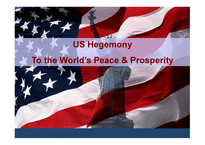
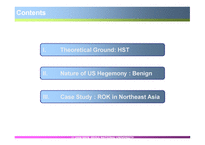
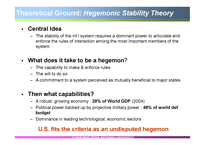
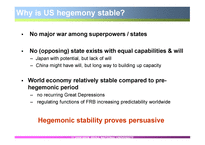
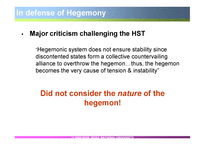
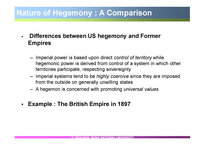
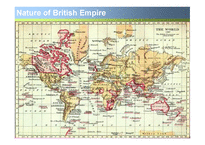
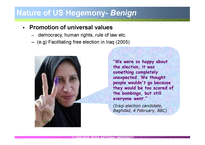
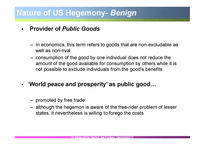
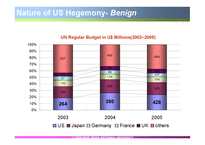
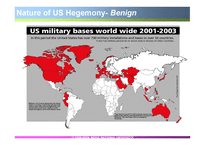
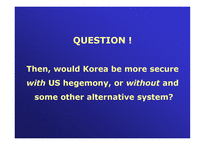
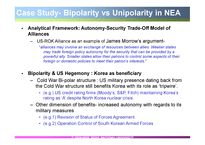
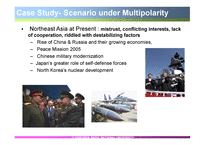
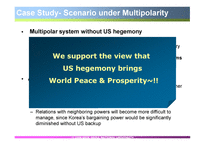
 분야
분야


